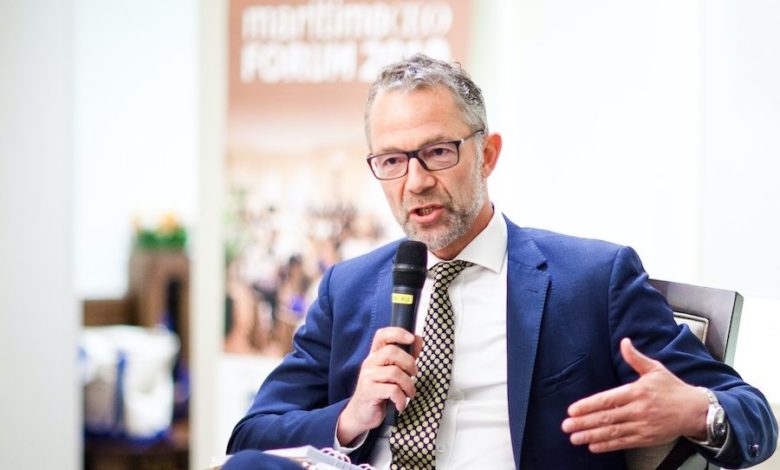Value of speaking with one voice is what 2021 has shown us

International cooperation and the importance of speaking with one voice are the key lessons to learn from 2021, according to InterManager president Mark O’Neil, CEO of Columbia Shipmanagement, who writes exclusively for Splash today.
As 2021 draws to a close shipping has faced environmental challenges, safety issues, and the monumental task of our supporting seafarers as they work through the ongoing Covid-19 pandemic. Good efforts have been made but more remains to be done.
I believe that, central to shipping’s approach to global issues, is collective cooperation. Shipping must speak with one voice at international level in order to be taken seriously and make a significant contribution to world debate.
With the benefit of hindsight, what did shipping actually achieve in COP26? Not nearly as much as it could have achieved if it had prepared itself better and had spoken with one voice on the commonly identified macro issues?
We need to cooperate to tackle the biggest challenges
InterManager, which this year celebrated its 30th anniversary, will be an even greater advocate of this one voice approach in 2022. That doesn’t have to be a single voice, it should be a collective voice with all sectors represented and speaking together.
For the shipmanagement sector, 2021 has remained challenging particularly in regard to crewing matters. Achieving timely crew changes has become something of an art as crewing departments navigate ever-changing regulations, border closures, and soaring airfares.
But the industry has worked together, led by organisations like InterManager, to lobby for all nations to recognise seafarers as key workers and to prioritise them for vaccination against Covid-19. And, to an extent, the world is beginning to understand the vital role shipping plays in the global supply chain.
Of course crew remain at the heart of what we do. Shipping is fundamentally a people industry and we can and must do more to support our seafarers. How else will we encourage young recruits to join us?
This year has seen a renewed focus on industry initiatives to support seafarer health and wellbeing, with many ship management companies providing enhanced connectivity to enable crew to keep in touch with home, improved onboard facilities, and assistance for those who may be struggling at sea.
Shipmanagers, despite competing on a business level, have pulled together to help repatriate stranded, sick or injured crew. InterManager provides a forum for its members to share information, resources and best-practice and this has been an effective and speedy way for managers to pool resources, particularly when facing challenges thrown up by Covid-19.
One of the significant achievements to emerge from this collective approach is the industry-wide recognition of the need for improved provision of medical oxygen onboard ships. When InterManager members raised the alarm after near-deaths on ocean-going voyages due to inadequate oxygen supply, the association quickly advised adopting a new, voluntary stock level and advocated the use of oxygen concentrators. It even negotiated a special price to ensure safety could be enhanced without busting budgets.
It’s this focus on raising standards that has led InterManager to begin working on new industry general principles and an enhanced code of conduct for its members. The document is in its final draft and looks set to be introduced early next year. Our new principles will give confidence to ship operators that an InterManager member company for ship or crew management will operate to high standards and meet their expectations.
Looking to 2022, the pandemic seems set to continue to present challenges for ship and crew managers. Meanwhile focus must also be given to the huge industry overhaul needed for shipping to meet its environmental goals. While it is necessary that ship managers concentrate on running efficient, cost-effective operations, the pandemic and the climate change crisis have shown us that we also need to cooperate to tackle the biggest challenges. Together we are stronger.

Would it no also be very helpful if crew management companies and ship owners, collectively set up and paid for vaccinations teams to visit ports to get the appalling low seafarer vaccinations rates much higher. Unvaccinated seafarers are still going to have regular problems during crew change even when governments start relaxing the rules.
Whilst advocating and lobbying governments is required, the fact that the maritime logistics industry can’t arrange the logistics of vaccinating crew members is somewhat of a joke. Instead, overall there is a reliance on charities to provide in port vaccinations.